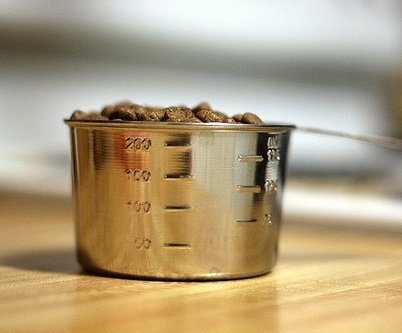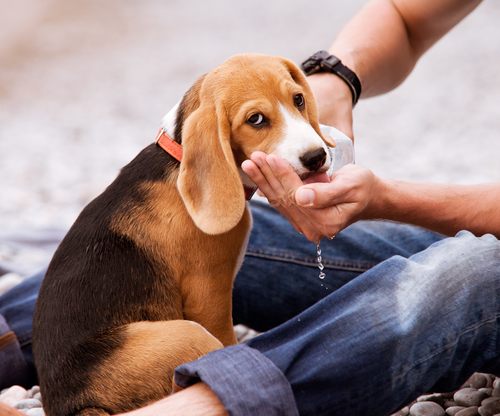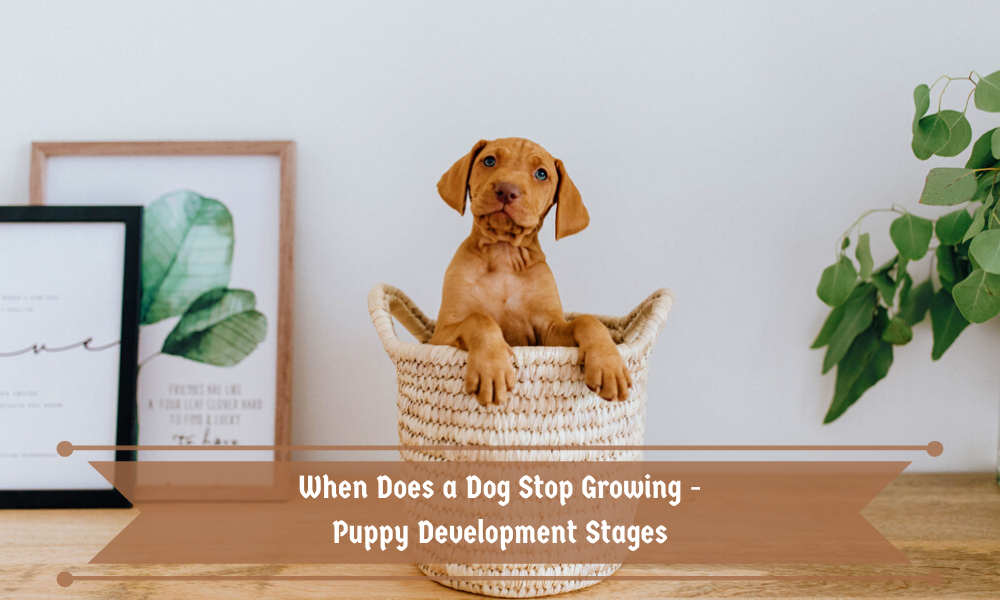
From the time that your puppy is a newborn until they’re one year of age, your dog is technically considered a puppy, no matter the size or the breed. Your puppy is constantly going through different stages of puppy development, especially during those first twelve weeks. However, did you know that there are many factors that influence your puppy’s growth and contribute towards when their growing stage comes to an end at their adult size?
Your pup’s rate of development depends on a variety of factors, including proper nutrition and their owner mother’s nutrition during pregnancy. You may also notice that a larger breed doesn’t tend to completely fill out before they’re two years of age, while a smaller breed will reach full size much more quickly. In this article, we’re going to take a look at how long puppies grow, when different breeds finish growing and just what’s going on with your puppy through their various development stages.
Contents
How Long Does It Take for A Puppy to Grow?
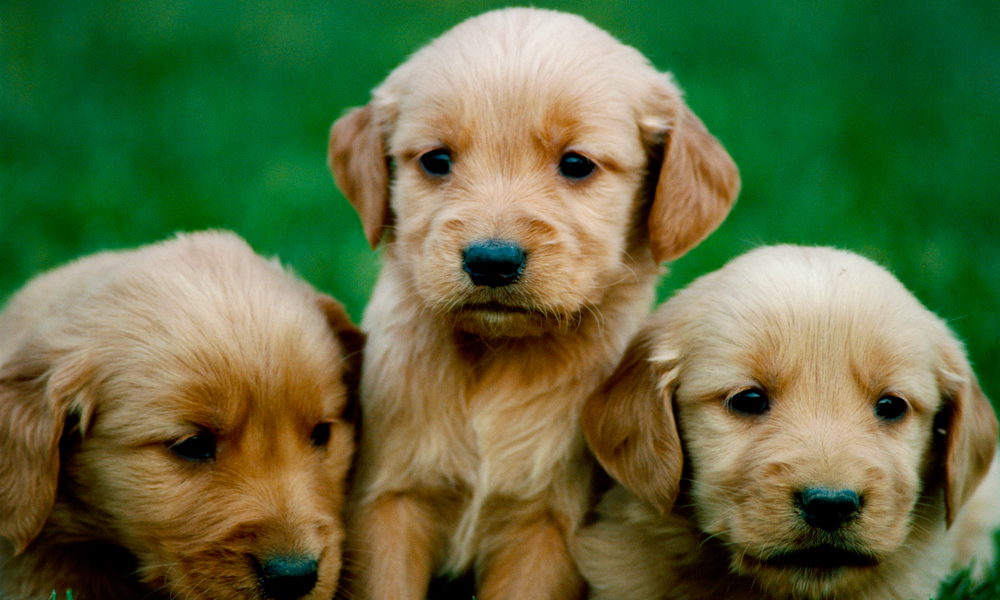
If you’ve owned a larger breed versus a smaller breed, you’ll probably notice some big changes, even after the first year. While your dog is no longer considered a puppy after year one, they can continue to change in both their size and height until they’re up to 24 months. In terms of what their height will be, this depends on their skeletal growth.
Your puppy’s final growth depends on what’s called growth plates, which is where the long bones in their legs grow from. These plates have a bit of flexibility and softnesswhile a dog is a puppy. As your pup grows and matures, bone tissue that was being formed becomes hard bone. When growth plates calcify, they stop growing new tissue, which means your puppy has stopped growing and will have reached their final size. Keep in mind that your puppy will still continue to develop both fat and muscle, so you may notice your pup “fill out” long after their skeleton has stopped developing.
When Does A Smaller Puppy BreedStop Growing?
Small and even medium sized breeds, like a Shih Tzu, Pomeranian and others, tend to grow quickly, reaching maturity at about half the age of larger breeds. If you think about it, this makes sense, given just how much more their larger counterparts have to grow in order to reach their final size. While a Saint Bernard weighs just 1 ½ lbs at birth, they can grow up to 180 lbs, increasing their size by 120-fold. On the other hand, a Chihuahua only weighs 5 ounces at birth and grows to about 5 lbs at maturity, only needing to increase their size by 15-fold. Therefore, small dog breeds will be finished growing anywhere from 6 to 8 months, while a medium sized breed will likely be mature after one year.
When Does A Larger Puppy BreedStop Growing?
Due to the fact that it takes time to convert food into new tissue, it takes larger breeds, like the German shepherd, Labrador retriever, and other large to giant breed dogs, longer than their smaller counterparts to reach their adult weight and size (besides the fact that they have so much more to grow then the tiny toy breed!). In general, giant breeds will grow until they are 12 to 18 months old, but very large pups won’t finish growing completely until their 2 years of age.
How do I Feed a Growing Puppy?
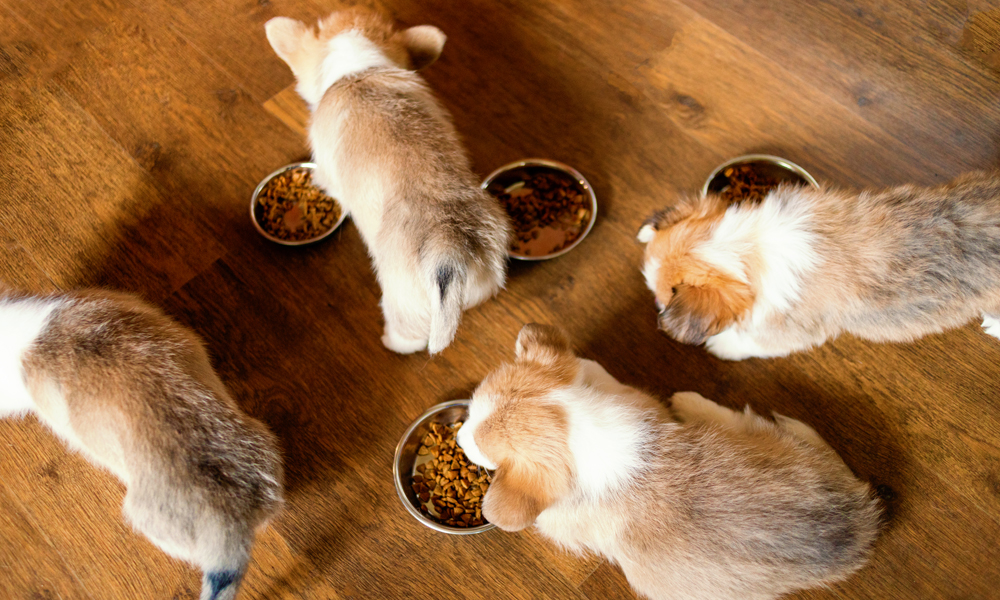
Nutrition is one of the key factors in making sure that your puppy reaches its full-size potential. Therefore, it’s important to make sure you’re feeding your puppy something that’s chock full of all the nutrients that a growing puppy needs. There are many natural, puppy-specific foods that are formulated to fit the needs of a growing puppy, including B vitamins (vitamin B-6, B-12, biotin, riboflavin, and folate, along with many others), Vitamin C, Vitamin D and Vitamin E.
You’ll also need to look out for protein requirements, which are the highest immediately after weaning, gradually decreasing as the puppy gets older. There are foods available that meet the nutritional guidelines set up by the Association of American Feed Control Officials (AAFCO), which are specifically designed for all life stages and will provide your pup all the nutrition they need. Although some prefer to mix up their pup’s food for variety as they get older, these particular foods don’t require a transition to an adult-specific food when they get older.
Is It Possible to Overfeed a Puppy?
It’s important to make sure that you do not overfeed your puppy and that you’re following the feeding guidelines so they do not become overweight. While an overweight puppy may be cute, obesity can lead to issues later down the line, especially in large breed puppies. Large breed puppies that are overweight are at increased risk for hip dysplasia and other orthopedic issues as adults.
How do I Feed Large and Giant Breed Puppies?
Large and giant breed puppies have more sensitivities when feeding than smaller breed puppies. This is especially true when it comes to their intake of calcium. Large and giant breed puppies must be fed the right amount of calcium for their growing bones, so it’s important to make sure they’re not getting an excess or a shortage. Check to ensure that the food you pick out for your pup states that it meets the nutritional requirements set in place by the AAFCO Dog Food Nutrient Profiles for growth or all life stages, including growth of large-size dogs (70 lbs or more as an adult).
Puppy Development Stages
Curious about what goes on during your puppy’s various development stages? Let’s take a look at the various puppy development stages, where your furry friend will do the majority of its growing.
Newborn

When your puppy is a newborn, they are completely dependent on their mother and littermates. At birth, they are blind, deaf and toothless, and are unable to even perform bodily functions on their own. Newborn puppies are also unable to regulate their body temperature, relying on both their mother and their littermates for warmth. This is while you’ll often see puppies lying in a warm huddle with their brothers and sisters – sadly, a newborn pup separated from their warm and cozy nest can quickly die from hypothermia, caused by low body temperature. This is an extremely critical stage in keeping a newborn puppy alive, as it learns to do even the most basic functions by itself.
Neonatal Period: Birth to Two Weeks
In the first two weeks of life, your puppy is sleeping nearly 90 percent of the time, spending all of their awake time nursing. Your puppy must put all of its energy into growing, as their birth weight doubles the first week – you can imagine how exhausting this would be! At this point, a puppy isn’t able to support their weight and will crawl around with paddling motions of their front legs in order to move around. Although these movements may not seem like much, they’re actually helping the puppy to develop muscle and coordination.
Even though a puppy has limited function at this early stage, they are still able to use their sense of smell and touch to find their mother, in order to feed off of her. While they will continue to feed from their mother for several more weeks, the first milk their mother produces (colostrum) is especially essential. It is rich in antibodies and will provide passive immunity from disease in these early weeks of life.
Transitional Period: Weeks Two to Four
These weeks of a puppy’s life bring many visible changes. Eyes and ears will begin to open, giving a newborn puppy their first real glimpse of the world. Before now, they will not have known what their mother and littermates looked or sounded like, and will begin the ability to start to expand their own puppy vocabulary to whines and barks. By about 15 days, a puppy will learn to stand and will take their first proper steps around day 21.
By the time a puppy reaches three weeks, they will have started rapidly progressing. They’ll start actively playing with their litter mates and begin sampling solid food. A puppy’s baby teeth will also start to rapidly grow in at this time, until they’re complete at five to six weeks old. A puppy begins to need their mother that little bit less and can even go to the bathroom on their own.
Socialization Period: Weeks Four to Twelve
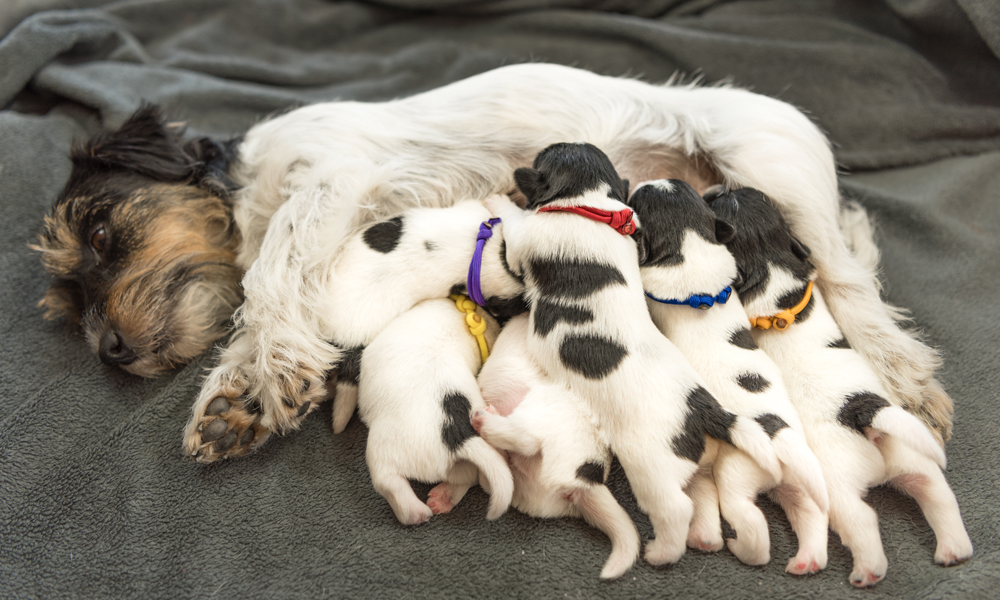
At four weeks of age, a mother’s milk production will already begin to slow down, as this is when solid food begins to be required, to help fulfill a puppy’s growing energy. Although a puppy is anywhere near ready to leave its mom and littermates until eight weeks, they will start to form attachments to those outside of their litter. By age six to eight weeks, puppies are truly able to accept others as part of their family.
This is a highly important period in terms of your puppy’s mental development. It’s important to make sure that a puppy is environmentally stimulated and is provided with everything that it needs to thrive during this time. It is the responsibility of the mother, the littermates, and you as the owner to make sure that their mental development is on par with where it should be.
Weeks Eight to Twelve
You may notice your puppy going through a stage where they seem afraid of everything. This is their “fear period”, where they’re reacting to new situations, including people and objects, with fear instead of curiosity. This is normal for puppies at this stage of development, but extra care should be taken to ensure that anything they encounter at this time doesn’t have a lasting negative effect on them, so it’s important not to overstimulate.
At eight-to-twelve weeks, your puppy is ready to begin their journey into their new home – with you! It’s important for pups to stay with their mother until they are at least eight weeks old (the older they are, the better). Although the most rapid changes occur growth wise during this period, this is truly only the beginning – your puppy has plenty more growing to do.
The Juvenile Delinquent: Weeks Ten to Sixteen
Your puppy has now entered the juvenile delinquent phase! This is truly the “naughty puppy” phase, where your pup is constantly testing their boundaries. While the juvenile puppy period begins around ten weeks and lasts until puberty, 10 to 16 weeks is when you’re going to see your pup act like a rebellious teenager. Your pup is going to constantly test their boundaries, and conveniently “forget” any training they’ve been taught.
Some of this behavior (mainly the chewing up everything in sight part) may be acting out from teething, as puppies start losing their baby teeth at three months of age. However, much of delinquent behavior is influenced by hormones. A male puppy’s testosterone level at age four to six months can be up to five times higher than an adult dog. This means that manners must be constantly enforced during this stage, in order to keep your pup focused.
Four to Six Months
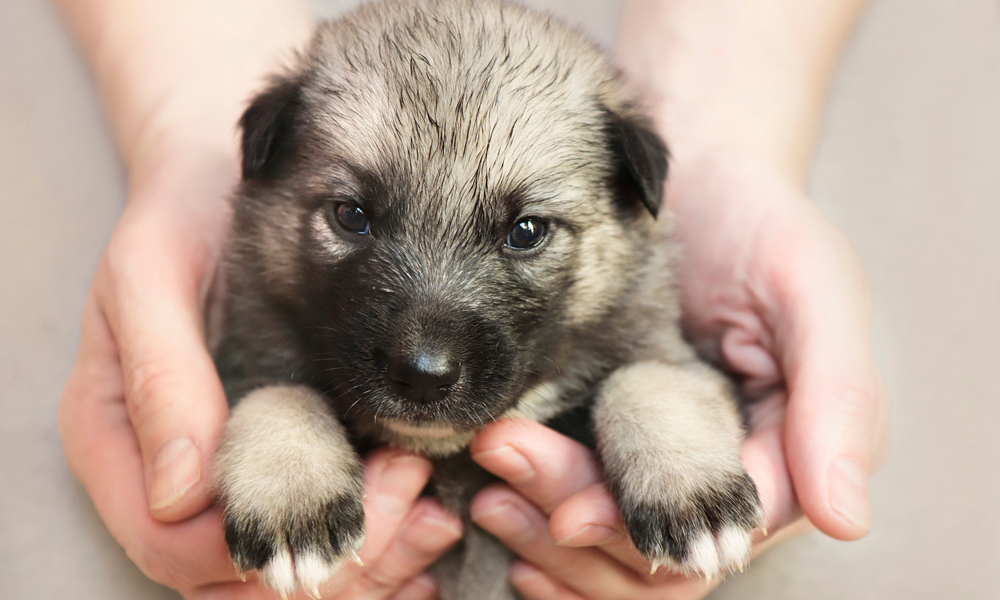
Now that your pup is four to six months, be prepared to constantly notice changes in their growth and development. Your puppy is going to be constantly testing and challenging you, as they try to figure out what their role is with not only you, but with other animals. Be prepared for some frisky behavior as well as play fighting, as your male pup’s testosterone levels continue to increase. If you do have older dogs in the house, feel free to let them put your younger pup in its place! Older dogs will recognize that no matter what the size of the pup, that they are still babies and need to gently be taught how to behave and what’s acceptable when playing.
Adolescence: Six to Twelve Months
The adolescence period is certainly going to be an interesting time for your pup – and for you! This is when they start to go into sexual maturity, although some female dogs may go into heat as early as five months. Your male pup’s testosterone level won’t fall down into a normal adult level until they are about 18 months of age, so this adolescence period lasts quite a while for them.
You’ll notice that your puppy has pretty well maxed out in terms of their height at this point, but that they will continue to fill out and grow muscle mass over the next six months to a year. Your puppy’s baby fur will start to be replaced by their adult coat and they will become interested in dogs of the opposite sex. This age is one of extremely high energy and it’s important to make sure that your puppy has a proper outlet for all their pent-up energy.
Social Maturity: One to Two Years
The vast majority of dogs will be physically mature at this age, even if they are a larger breed. If your pup is a small breed, they will likely have matured long before this. Although your puppy is now considered an adult dog, they still have a great deal of energy at this age, but have started to lose most of their juvenile delinquent behavior. This is a great time to reinforce training that they’ve already been taught and start expanding on their knowledge by teaching them new tricks. Socialization throughout your dog’s life is important, as a well-socialized dog is generally a happy, well-rounded dog.
From Puppy to Full Grown Dog
We hope we have taught you a little something about the many wondrous life stages that come along with a growing puppy, as well as a good idea on when you can expect your pup’s growth stage to come to a halt. No matter what stage your dog joins your family, your pup is in for a lifetime of love ahead of them as your furry best friend!
I grew up in a household that was filled with animals. I believe that my fate as a dog-loving person was sealed in early childhood since my parents owned several dogs of varying sizes and breeds. There was no choice but to take care of and learn about dog habits and the best animal care practices — otherwise, I’d be clueless about how to go about the creatures I was surrounded by day and night.
As a life-long puppy lover, I know a thing or two about dogs and how to go about caring for them in the best way possible. Although I’m not a professionally trained dog behaviorist, trainer, or veterinarian, all of my knowledge and experience with canines comes from a place of love and a deep-rooted passion for dogs and animals in general.
Seeing as dogs kept me company throughout every stage of my life, I decided to follow a different path in my academic life and obtained a Bachelor’s and Master’s degrees in Marketing Management and Digital Advertising, which ultimately allowed me to combine my professional training and personal experience by creating the ultimate dog lover’s resource website! Along with my husband, Dave, I run MySweetPuppy for like-minded dog lovers who want to have a single, clear, and reliable information source about anything and everything related to dogs and their well-being.

